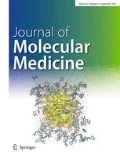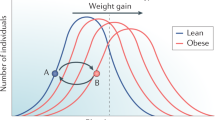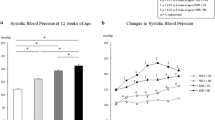Abstract
Metabolic syndrome, which is caused by obesity, is now a global pandemic. Metabolic syndrome is an aggregation of hypertension, diabetes and dyslipidaemia. Insulin resistance is a key factor in the development of these components of metabolic syndrome. Concerning the mechanism for the development of hypertension in metabolic syndrome, the lack of insulin resistance in the kidney increases sodium reabsorption by hyperinsulinaemia, leading to sodium retention in the body, and resultant salt-sensitive hypertension. Moreover, hyperaldosteronism, which is caused by adipocyte-derived aldosterone-releasing factors, induces not only salt-sensitive hypertension, but also proteinuria in obese hypertensive rats. Salt loading markedly aggravates proteinuria and induces cardiac diastolic dysfunction in obese hypertensive rats, suggesting that salt and aldosterone exert unfavourable synergistic actions on the cardiovascular system, possibly through the overproduction of oxidative stress. In turn, reactive oxygen species (ROS), which are induced by adipokines such as tumour necrosis factor-α, non-esterified fatty acids, angiotensinogen etc., can activate the mineralocorticoid (MR) receptor, in an aldosterone-independent fashion. Therefore, aldosterone/MR activation plays a key role not only in the development of salt-sensitive hypertension, but also in cardiovascular injury in metabolic syndrome, possibly through its function as a feed-forward system.



Similar content being viewed by others
References
Lakka HM, Laaksonen DE, Lakka TA, Niskanen LK, Kumpusalo E, Tuomilehto J, Salonen JT (2002) The metabolic syndrome and total and cardiovascular disease mortality in middle-aged men. JAMA 288:2709–2716
Chen J, Muntner P, Hamm LL, Jones DW, Batuman V, Fonseca V, Whelton PK, He J (2004) The metabolic syndrome and chronic kidney disease in U.S. adults. Ann Intern Med 140:167–174
Nagase M, Yoshida S, Shibata S, Nagase T, Gotoda T, Ando K, Fujita T (2006) Enhanced aldosterone signaling in the early nephropathy of rats with metabolic syndrome: possible contribution of fat-derived factors. J Am Soc Nephrol 17:3438–3446
Nagase M, Matsui H, Shibata S, Gotoda T, Fujita T (2007) Salt-induced nephropathy in obese spontaneously hypertensive rats via paradoxical activation of the mineralocorticoid receptor: role of oxidative stress. Hypertension 50:877–883
Natali A, Quiñones Galvan A, Santoro D, Pecori N, Taddei S, Salvetti A, Ferrannini E (1993) Relationship between insulin release, antinatriuresis and hypokalaemia after glucose ingestion in normal and hypertensive man. Clin Sci (Lond) 85:327–335
Zheng Y, Yamada H, Sakamoto K, Horita S, Kunimi M, Endo Y, Li Y, Tobe K, Terauchi Y, Kadowaki T, Seki G, Fujita T (2005) Roles of insulin receptor substrates in insulin-induced stimulation of renal proximal bicarbonate absorption. J Am Soc Nephrol 16:2288–2295
Uzu T, Kimura G, Yamauchi A, Kanasaki M, Isshiki K, Araki S, Sugiomoto T, Nishio Y, Maegawa H, Koya D, Haneda M, Kashiwagi A (2006) Enhanced sodium sensitivity and disturbed circadian rhythm of blood pressure in essential hypertension. J Hypertens 24:1627–1632
Rocchini AP, Key J, Bondie D, Chico R, Moorehead C, Katch V, Martin M (1989) The effect of weight loss on the sensitivity of blood pressure to sodium in obese adolescents. N Engl J Med 321:580–585
Strazzullo P, Barbato A, Galletti F, Barba G, Siani A, Iacone R, D’Elia L, Russo O, Versiero M, Farinaro E, Cappucio FP (2006) Abnormalities of renal sodium handling in the metabolic syndrome. Results of the Olivetti Heart study. J Hypertens 24:1633–1639
DeFronzo RA, Cooke CR, Andres R, Faloona GR, Davis PJ (1975) The effect of insulin on renal handling of sodium, potassium, calcium, and phosphate in man. J Clin Invest 55:845–855
Hall JE, Kuo JJ, da Silva AA, de Paula RB, Liu J, Tallam L (2003) Obesity-associated hypertension and kidney disease. Curr Opin Nephrol Hypertens 12:195–200
de Paula RB, da Silva AA, Hall JE (2004) Aldosterone antagonism attenuates obesity-induced hypertension and glomerular hyperfiltration. Hypertension 43:41–47
Connell JMC, Davies E (2005) The new biology of aldosterone. J Endocrinol 186:1–20
Shibata S, Nagase M, Yoshida S, Kawachi H, Fujita T (2007) Podocyte as the target for aldosterone: roles of oxidative stress and Sgk1. Hypertension 49:355–364
Ehrhart-Bornstein M, Lamounier-Zepter V, Schraven A, Langenbach J, Willenberg HS, Barthel A, Hauner H, McCann SM, Scherbaum WA, Bornstein SR (2003) Human adipocytes secrete mineralocorticoid-releasing factors. Proc Natl Acad Sci U S A 100:14211–14216
Verhave JC, Hillege HL, Burgerhof JGM, Janssen WMT, Gansevoort RT, Navis GJ, de Zeeuw D, de Jong PE; PRVEND Study Group (2004) Sodium intake affects urinary albumin excretion especially in overweight subjects. J Intern Med 256:324–330
Nagase M, Shibata S, Yoshida S, Nagase T, Gotoda T, Fujita T (2006) Podocyte injury underlies the glomerulopathy of Dahl salt-hypertensive rats and is reversed by aldosterone blocker. Hypertension 47:1084–1093
Funder JW (2004) Is aldosterone bad for the heart? Trends Endocrinol Metab 15:139–142
Bossis G, Melchior F (2006) Regulation of SUMOylation by reversible oxidation of SUMO conjugating enzymes. Mol Cell 21:349–357
Pitt B (2004) Effect of aldosterone blockade in patients with systolic left ventricular dysfunction: implications of the RALES and EPHESUS studies. Mol Cell Endocrinol 217:53–58
Bochud M, Nussberger J, Bovet P, Maillard MR, Elston RC, Paccaud F, Shamlaye C, Burnier M (2006) Plasma aldosterone is independently associated with the metabolic syndrome. Hypertension 48:239–245
Onozato ML, Tojo A, Kobayashi N, Goto A, Matsuoka H, Fujita T (2007) Dual blockade of aldosterone and angiotensin II additively suppresses TGF-beta and NADPH oxidase in the hypertensive kidney. Nephrol Dial Transplant 22:1314–1322
Epstein M, Buckalew V, Martinez F, Altamirano J, Roniker B, Kleiman J, Krause S (2002) Antiproteinuric efficacy of eplerenone, enalapril, and eplerenone/enalapril combination therapy in diabetic hypertensives with microalbuminuria. Am J Hypertens 15:24A
Hinokio Y, Suzuki S, Hirai M, Suzuki C, Suzuki M, Toyota T (2002) Urinary excretion of 8-oxo-7, 8-dihydro-2′-deoxyguanosine as a predictor of the development of diabetic nephropathy. Diabetologia 45:877–882
Ogihara T, Asano T, Ando K, Sakoda H, Anai M, Shojima N, Ono H, Onishi Y, Fujishiro M, Katagiri H, Fukushima Y, Kikuchi M, Noguchi N, Aburatani H, Komuro I, Fujita T (2002) Angiotensin II-induced insulin resistance is associated with enhanced insulin signaling. Hypertension 40:872–879
Ogihara T, Asano T, Katagiri H, Sakoda H, Anai M, Shojima N, Ono H, Fujishiro M, Kushiyama A, Fukushima A, Kikuchi M, Noguchi N, Aburatani H, Gotoh Y, Komuro I, Fujita T (2004) Oxidative stress induces insulin resistance by activating the nuclear factor-kappa B pathway and disrupting normal subcellular distribution of phosphatidylinositol 3-kinase. Diabatologia 47:794–805
Roberge C, Carpentier AC, Langlois MF, Baillargeon JP, Ardilouze JL, Maheux P, Gallo-Payet N (2007) Adrenocortical dysregulation as a major player in insulin resistance and onset of obesity. Am J Physiol Endocrinol Metab 293:E1465–E1478
Jaffe IZ, Mendelsohn ME (2005) Angiotensin II and aldosterone regulate gene transcription via functional mineralocortocoid receptors in human coronary artery smooth muscle cells. Circ Res 96:643–650
Sugiyama T, Yoshimoto T, Tsuchiya K, Gochou N, Hirono Y, Tateno T, Fukai N, Shichiri M, Hirata Y (2005) Aldosterone induces angiotensin converting enzyme gene expression via a JAK2-dependent pathway in rat endothelial cells. Endocrinology 146:3900–3906
Fareh J, Touyz RM, Schiffrin EL, Thibault G (1997) Cardiac type-1 angiotensin II receptor status in deoxycorticosterone acetate-salt hypertension in rats. Hypertension 30:1253–1259
Rocha R, Martin-Berger CL, Yang P, Scherrer R, Delyani J, McMahon E (2002) Selective aldosterone blockade prevents angiotensin II/salt-induced vascular inflammation in the rat heart. Endocrinology 143:4828–4836
Velasquez MT, Striffler JS, Abraham AA, Michaelis OE, Scalbert E, Thibault N (1997) Perindopril ameliorates glomerular and renal tubulointerstitial injury in the SHR/N-corpulent rat. Hypertension 30:1232–1237
Nguyen G, Delarue F, Burcklé C, Bouzhir L, Giller T, Sraer JD (2002) Pivotal role of the renin/prorenin receptor in angiotensin II production and cellular responses to renin. J Clin Invest 109:1417–1427
Peters B, Grisk O, Becher B, Wanka H, Kuttler B, Lüdemann J, Lorenz G, Retting R, Mullins JJ, Peters J (2008) Dose-dependent titration of prorenin and blood pressure in Cyp1a1ren-2 transgenic rats: absence of prorenin-induced glomerulosclerosis. J Hypertens 26:102–109
Author information
Authors and Affiliations
Corresponding author
Rights and permissions
About this article
Cite this article
Fujita, T. Aldosterone in salt-sensitive hypertension and metabolic syndrome. J Mol Med 86, 729–734 (2008). https://doi.org/10.1007/s00109-008-0343-1
Received:
Revised:
Accepted:
Published:
Issue Date:
DOI: https://doi.org/10.1007/s00109-008-0343-1




